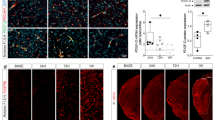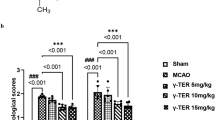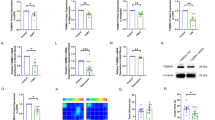Abstract
Rationale
Microglia regulate the inflammation of the central nervous system and play a crucial role in the pathogenesis of depression. Moreover, Jmjd3 is involved in microglia polarization. Mounting studies reported the beneficial effects of human umbilical cord mesenchymal stem cells (HUC-MSCs) on myocardial infarction (MI), Unfortunately, its effects on MI-induced depression and its underlying mechanisms remain unclear.
Objectives
We aimed to investigate the antidepressant effects of HUC-MSCs and their impacts on microglia polarization.
Methods
In the current study, the MI model was established by ligating the left anterior descending coronary artery. Mice were injected with HUC-MSCs or PBS through the tail vein 1week after the surgery. The sucrose preference test (SPT), tail suspension test (TST), and forced swim test (FST) were performed to evaluate depression-like behavior. Cardiac function and myocardial fibrosis were evaluated at the end of the experiments. Immunofluorescence, Western blot, ELISA, and qRT-PCR were used to detect the levels of Jmjd3 and microglia-related markers and inflammatory factors.
Results
HUC-MSC treatment significantly improved cardiac function, reduced the area of myocardial fibrosis, and alleviated depression-like behaviors induced by MI. HUC-MSCs inhibited the expression of Jmjd3 and promoted the switch of microglia in the prefrontal cortex, hypothalamus, and hippocampus from M1 to M2, thereby decreased the level of pro-inflammatory factors.
Conclusion
HUC-MSCs have cardioprotective and potential anti-depressive effects induced by MI related to the inflammation improved by regulating Jmjd3 and microglial polarization.






Similar content being viewed by others
References
Badoer E (2010) Microglia: activation in acute and chronic inflammatory states and in response to cardiovascular dysfunction. Int J Biochem Cell Biol 42:1580–1585. https://doi.org/10.1016/j.biocel.2010.07.005
Baraniak PR, McDevitt TC (2010) Stem cell paracrine actions and tissue regeneration. Regen Med 5:121–143. https://doi.org/10.2217/rme.09.74
Benyamini Y, Roziner I, Goldbourt U, Drory Y, Gerber Y, Israel Study Group on First Acute Myocardial I (2013) Depression and anxiety following myocardial infarction and their inverse associations with future health behaviors and quality of life. Ann Behav Med 46:310–321. https://doi.org/10.1007/s12160-013-9509-3
Butovsky O, Weiner HL (2018) Microglial signatures and their role in health and disease. Nat Rev Neurosci 19:622–635. https://doi.org/10.1038/s41583-018-0057-5
Can A, Dao DT, Arad M, Terrillion CE, Piantadosi SC, Gould TD (2012a) The mouse forced swim test J Vis Exp:e3638. https://doi.org/10.3791/3638
Can A, Dao DT, Terrillion CE, Piantadosi SC, Bhat S, Gould TD (2012b) The tail suspension test J Vis Exp:e3769. https://doi.org/10.3791/3769
Colton CA (2009) Heterogeneity of microglial activation in the innate immune response in the brain. J Neuroimmune Pharmacol 4:399–418. https://doi.org/10.1007/s11481-009-9164-4
DiSante JL, Bires AM, Cline TW, Waterstram-Rich K (2017) An analysis of the prevalence of depression post-myocardial infarction. Crit Care Nurs Q 40:124–136. https://doi.org/10.1097/CNQ.0000000000000149
Dworak M, Stebbing M, Kompa AR, Rana I, Krum H, Badoer E (2014) Attenuation of microglial and neuronal activation in the brain by ICV minocycline following myocardial infarctionc. Auton Neurosci 185:43–50. https://doi.org/10.1016/j.autneu.2014.03.007
Frasure-Smith N, Lesperance F, Gravel G, Masson A, Juneau M, Talajic M, Bourassa MG (2000) Depression and health-care costs during the first year following myocardial infarction. J Psychosom Res 48:471–478. https://doi.org/10.1016/s0022-3999(99)00088-4
Ge Y, Xu W, Zhang L, Liu M (2020) Ginkgolide B attenuates myocardial infarction-induced depression-like behaviors via repressing IL-1beta in central nervous system. Int Immunopharmacol 85:106652. https://doi.org/10.1016/j.intimp.2020.106652
Headrick JP, Peart JN, Budiono BP, Shum DHK, Neumann DL, Stapelberg NJC (2017) The heartbreak of depression: ‘psycho-cardiac’ coupling in myocardial infarction. J Mol Cell Cardiol 106:14–28. https://doi.org/10.1016/j.yjmcc.2017.03.007
Hoschar S, Pan J, Wang Z, Fang X, Tang X’, Shi W, Tu R, Xi P, Che W, Wang H, Li Y, Fritzsche K, Liu X, Ladwig KH, Ma W (2019) The MEDEA FAR-EAST Study: Conceptual framework, methods and first findings of a multicenter cross-sectional observational study. BMC Emerg Med 19:31. https://doi.org/10.1186/s12873-019-0240-7
Hsuan YC, Lin CH, Chang CP, Lin MT (2016) Mesenchymal stem cell-based treatments for stroke, neural trauma, and heat stroke. Brain Behav 6:e00526. https://doi.org/10.1002/brb3.526
Huang X, Fei GQ, Liu WJ, Ding J, Wang Y, Wang H, Ji JL, Wang X (2020) Adipose-derived mesenchymal stem cells protect against CMS-induced depression-like behaviors in mice via regulating the Nrf2/HO-1 and TLR4/NF-kappaB signaling pathways. Acta Pharmacol Sin 41:612–619. https://doi.org/10.1038/s41401-019-0317-6
Jia X, Gao Z, Hu H (2020) Microglia in depression: current perspectives. Sci China Life Sci 64:911–925. https://doi.org/10.1007/s11427-020-1815-6
Jose S, Tan SW, Ooi YY, Ramasamy R, Vidyadaran S (2014) Mesenchymal stem cells exert anti-proliferative effect on lipopolysaccharide-stimulated BV2 microglia by reducing tumour necrosis factor-alpha levels. J Neuroinflammation 11:149. https://doi.org/10.1186/s12974-014-0149-8
Kin K, Yasuhara T, Kameda M, Tomita Y, Umakoshi M, Kuwahara K, Kin I, Kidani N, Morimoto J, Okazaki M, Sasaki T, Tajiri N, Borlongan CV, Date I (2020) Cell encapsulation enhances antidepressant effect of the mesenchymal stem cells and counteracts depressive-like behavior of treatment-resistant depressed rats. Mol Psychiatry 25:1202–1214. https://doi.org/10.1038/s41380-018-0208-0
Lauzon C, Beck CA, Huynh T, Dion D, Racine N, Carignan S, Diodati JG, Charbonneau F, Dupuis R, Pilote L (2003) Depression and prognosis following hospital admission because of acute myocardial infarction. CMAJ 168:547–552
Li T, Xia M, Gao Y, Chen Y, Xu Y (2015) Human umbilical cord mesenchymal stem cells: an overview of their potential in cell-based therapy. Expert Opin Biol Ther 15:1293–1306. https://doi.org/10.1517/14712598.2015.1051528
Li J, Wang H, du C, Jin X, Geng Y, Han B, Ma Q, Li Q, Wang Q, Guo Y, Wang M, Yan B (2020) hUC-MSCs ameliorated CUMS-induced depression by modulating complement C3 signaling-mediated microglial polarization during astrocyte-microglia crosstalk. Brain Res Bull 163:109–119. https://doi.org/10.1016/j.brainresbull.2020.07.004
Liu G, Lv H, An Y, Wei X, Yi X, Yi H (2018) Tracking of transplanted human umbilical cord-derived mesenchymal stem cells labeled with fluorescent probe in a mouse model of acute lung injury. Int J Mol Med 41:2527–2534. https://doi.org/10.3892/ijmm.2018.3491
Liu M, Liu J, Zhang L, Geng Q, Ge Y (2019) Antidepressant-like effects of ginseng fruit saponin in myocardial infarction mice. Biomed Pharmacother 115:108900. https://doi.org/10.1016/j.biopha.2019.108900
Luger D, Lipinski MJ, Westman PC, Glover DK, Dimastromatteo J, Frias JC, Albelda MT, Sikora S, Kharazi A, Vertelov G, Waksman R, Epstein SE (2017) Intravenously delivered mesenchymal stem cells: systemic anti-inflammatory effects improve left ventricular dysfunction in acute myocardial infarction and ischemic cardiomyopathy. Circ Res 120:1598–1613. https://doi.org/10.1161/CIRCRESAHA.117.310599
Ma W, Shen D, Liu J, Pan J, Yu L, Shi W, Deng L, Zhu L, Yang F, Liu J, Cai W, Yang J, Luo Y, Cui H, Liu S (2016) Statin function as an anti-inflammation therapy for depression in patients with coronary artery disease by downregulating interleukin-1beta. J Cardiovasc Pharmacol 67:129–135. https://doi.org/10.1097/FJC.0000000000000323
Meijer A, Conradi HJ, Bos EH, Thombs BD, van Melle JP, de Jonge P (2011) Prognostic association of depression following myocardial infarction with mortality and cardiovascular events: a meta-analysis of 25 years of research. Gen Hosp Psychiatry 33:203–216. https://doi.org/10.1016/j.genhosppsych.2011.02.007
Misrani A, Tabassum S, Chen X, Tan SY, Wang JC, Yang L, Long C (2019) Differential effects of citalopram on sleep-deprivation-induced depressive-like behavior and memory impairments in mice. Prog Neuropsychopharmacol Biol Psychiatry 88:102–111. https://doi.org/10.1016/j.pnpbp.2018.07.013
Nakagawa Y, Chiba K (2015) Diversity and plasticity of microglial cells in psychiatric and neurological disorders. Pharmacol Ther 154:21–35. https://doi.org/10.1016/j.pharmthera.2015.06.010
Park HJ, Oh SH, Kim HN, Jung YJ, Lee PH (2016) Mesenchymal stem cells enhance alpha-synuclein clearance via M2 microglia polarization in experimental and human parkinsonian disorder. Acta Neuropathol 132:685–701. https://doi.org/10.1007/s00401-016-1605-6
Przanowski P, Dabrowski M, Ellert-Miklaszewska A, Kloss M, Mieczkowski J, Kaza B, Ronowicz A, Hu F, Piotrowski A, Kettenmann H, Komorowski J, Kaminska B (2014) The signal transducers Stat1 and Stat3 and their novel target Jmjd3 drive the expression of inflammatory genes in microglia. J Mol Med (Berl) 92:239–254. https://doi.org/10.1007/s00109-013-1090-5
Rajkowska G, Miguel-Hidalgo JJ (2007) Gliogenesis and glial pathology in depression CNS. Neurol Disord Drug Targets 6:219–233. https://doi.org/10.2174/187152707780619326
Salminen A, Kaarniranta K, Hiltunen M, Kauppinen A (2014) Histone demethylase Jumonji D3 (JMJD3/KDM6B) at the nexus of epigenetic regulation of inflammation and the aging process. J Mol Med (Berl) 92:1035–1043. https://doi.org/10.1007/s00109-014-1182-x
Smolderen KG, Buchanan DM, Gosch K, Whooley M, Chan PS, Vaccarino V, Parashar S, Shah AJ, Ho PM, Spertus JA (2017) Depression treatment and 1-year mortality after acute myocardial infarction: insights from the TRIUMPH Registry (Translational Research Investigating Underlying Disparities in Acute Myocardial Infarction Patients’ Health Status). Circulation 135:1681–1689. https://doi.org/10.1161/CIRCULATIONAHA.116.025140
Sun X, Hao H, Han Q, Song X, Liu J, Dong L, Han W, Mu Y (2017) Human umbilical cord-derived mesenchymal stem cells ameliorate insulin resistance by suppressing NLRP3 inflammasome-mediated inflammation in type 2 diabetes rats. Stem Cell Res Ther 8:241. https://doi.org/10.1186/s13287-017-0668-1
Sweda R, Siontis GCM, Nikolakopoulou A, Windecker S, Pilgrim T (2020) Antidepressant treatment in patients following acute coronary syndromes: a systematic review and Bayesian meta-analysis. ESC Heart Fail 7:3610–3620. https://doi.org/10.1002/ehf2.12861
Tang Y, Li T, Li J, Yang J, Liu H, Zhang XJ, Le W (2014) Jmjd3 is essential for the epigenetic modulation of microglia phenotypes in the immune pathogenesis of Parkinson’s disease. Cell Death Differ 21:369–380. https://doi.org/10.1038/cdd.2013.159
Tang J, Yu W, Chen S, Gao Z, Xiao B (2018a) Microglia polarization and endoplasmic reticulum stress in chronic social defeat stress induced depression mouse. Neurochem Res 43:985–994. https://doi.org/10.1007/s11064-018-2504-0
Tang MM, Lin WJ, Pan YQ, Li YC (2018b) Fibroblast growth factor 2 modulates hippocampal microglia activation in a neuroinflammation induced model of depression. Front Cell Neurosci 12:255. https://doi.org/10.3389/fncel.2018.00255
Tfilin M, Sudai E, Merenlender A, Gispan I, Yadid G, Turgeman G (2010) Mesenchymal stem cells increase hippocampal neurogenesis and counteract depressive-like behavior. Mol Psychiatry 15:1164–1175. https://doi.org/10.1038/mp.2009.110
Thackeray JT, Hupe HC, Wang Y, Bankstahl JP, Berding G, Ross TL, Bauersachs J, Wollert KC, Bengel FM (2018) myocardial inflammation predicts remodeling and neuroinflammation after myocardial infarction. J Am Coll Cardiol 71:263–275. https://doi.org/10.1016/j.jacc.2017.11.024
Thombs BD, Bass EB, Ford DE, Stewart KJ, Tsilidis KK, Patel U, Fauerbach JA, Bush DE, Ziegelstein RC (2006) Prevalence of depression in survivors of acute myocardial infarction. J Gen Intern Med 21:30–38. https://doi.org/10.1111/j.1525-1497.2005.00269.x
Troubat R, Barone P, Leman S, Desmidt T, Cressant A, Atanasova B, Brizard B, el Hage W, Surget A, Belzung C, Camus V (2021) Neuroinflammation and depression: a review. Eur J Neurosci 53:151–171. https://doi.org/10.1111/ejn.14720
Wang R, Wang W, Xu J, Liu D, Jiang H, Pan F (2018a) Dynamic effects of early adolescent stress on depressive-like behaviors and expression of cytokines and JMJD3 in the prefrontal cortex and hippocampus of rats. Front Psychiatry 9:471. https://doi.org/10.3389/fpsyt.2018.00471
Wang YL, Han QQ, Gong WQ, Pan DH, Wang LZ, Hu W, Yang M, Li B, Yu J, Liu Q (2018b) Microglial activation mediates chronic mild stress-induced depressive- and anxiety-like behavior in adult rats. J Neuroinflammation 15:21. https://doi.org/10.1186/s12974-018-1054-3
Wang HW, Ahmad M, Jadayel R, Najjar F, Lagace D, Leenen FHH (2019) Inhibition of inflammation by minocycline improves heart failure and depression-like behaviour in rats after myocardial infarction. PLoS One 14:e0217437. https://doi.org/10.1371/journal.pone.0217437
Wang R, Wang W, Xu J, Liu D, Wu H, Qin X, Jiang H, Pan F (2020) Jmjd3 is involved in the susceptibility to depression induced by maternal separation via enhancing the neuroinflammation in the prefrontal cortex and hippocampus of male rats. Exp Neurol 328:113254. https://doi.org/10.1016/j.expneurol.2020.113254
Willner P, Towell A, Sampson D, Sophokleous S, Muscat R (1987) Reduction of sucrose preference by chronic unpredictable mild stress, and its restoration by a tricyclic antidepressant. Psychopharmacology (Berl) 93:358–364. https://doi.org/10.1007/BF00187257
Yan Q, Sun L, Zhu Z, Wang L, Li S, Ye RD (2014) Jmjd3-mediated epigenetic regulation of inflammatory cytokine gene expression in serum amyloid A-stimulated macrophages. Cell Signal 26:1783–1791. https://doi.org/10.1016/j.cellsig.2014.03.025
Yan W, Abu-El-Rub E, Saravanan S, Kirshenbaum LA, Arora RC, Dhingra S (2019) Inflammation in myocardial injury: mesenchymal stem cells as potential immunomodulators. Am J Physiol Heart Circ Physiol 317:H213–H225. https://doi.org/10.1152/ajpheart.00065.2019
Yokokawa K, Iwahara N, Hisahara S, Emoto MC, Saito T, Suzuki H, Manabe T, Matsumura A, Matsushita T, Suzuki S, Kawamata J, Sato-Akaba H, Fujii HG, Shimohama S (2019) Transplantation of mesenchymal stem cells improves amyloid-beta pathology by modifying microglial function and suppressing oxidative stress. J Alzheimers Dis 72:867–884. https://doi.org/10.3233/JAD-190817
Zhang L, Zhang J, You Z (2018) Switching of the microglial activation phenotype is a possible treatment for depression disorder. Front Cell Neurosci 12:306. https://doi.org/10.3389/fncel.2018.00306
Funding
This study was supported by the National Key R&D Program of China (2018YFC1314700), Shanghai Municipal Health Commission Foundation of Shanghai (2019ZB0202, 2019SY026), Tongji Hospital of Tongji University (ITJ[ZD]1809), and National Natural Science Foundation of China (82060242).
Author information
Authors and Affiliations
Corresponding author
Ethics declarations
Conflict of interest
The authors declare no competing interests.
Additional information
Publisher’s note
Springer Nature remains neutral with regard to jurisdictional claims in published maps and institutional affiliations.
Supplementary information
ESM 1
(PNG 237 kb)
Rights and permissions
About this article
Cite this article
Zhang, Y., Wang, X., Li, Y. et al. Human umbilical cord mesenchymal stem cells ameliorate depression by regulating Jmjd3 and microglia polarization in myocardial infarction mice. Psychopharmacology 238, 2973–2984 (2021). https://doi.org/10.1007/s00213-021-05912-w
Received:
Accepted:
Published:
Issue Date:
DOI: https://doi.org/10.1007/s00213-021-05912-w




